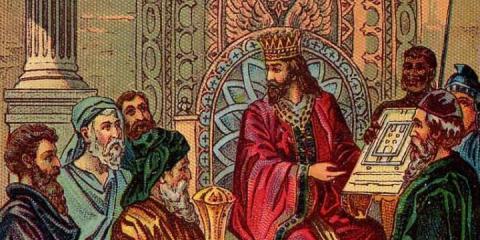Found evidence of King Solomon's naval empire?
While there is controversial evidence of the existence of a royal “House of David” in the land of Israel, and conclusive evidence of later biblical kings such as Omri, no direct evidence of Solomon or his reign has yet been discovered.
As a result, archeologists and historians have begun to believe that Solomon was either an outright myth or a minor tribal chieftain who ruled only a small area around Jerusalem, rather than the vast kingdom described by the Bible.
Now, archaeologist Dr. Sean Kingsley is challenging that consensus, holding that the picture of Solomon in the Bible is largely accurate. He has reached this view by adopting an alternative method of investigation. Rather than searching for evidence of Solomon in Israel itself, he has investigated the Mediterranean basin for evidence of the empire that the Bible says Solomon built in alliance with the Phoenician king Hiram.
“I’ve spread a very wide net,” Kingsley told the Observer. “That kind of maritime study has never been done before.” “For 100 years, archaeologists have scrutinized Jerusalem’s holy soils, the most excavated city in the world,” he said. “Nothing definitive fits the book of Kings’ and Chronicles’ epic accounts of Solomon’s palace and temple.” However, he said, “by exploring traces of ports, warehouses, industry, and shipwrecks, new evidence shakes up the quest for truth.”
Kingsley holds that the evidence from across the Mediterranean reveals the existence of “a Phoenician coast,” with numerous sites involved in mining and trade, including Rio Tinto in Spain, where there is a site described in old maps as “Solomon’s Hill” or “Solomon’s Castle.” An early sixteenth-century account says this was a site where gold and silver were mined on Solomon’s behalf. Kingsley states that isotope analysis has shown that silver hoards discovered in Israel originated in Spain.
Further evidence such as weights and pottery at nearby Huelva, Spain shows a connection to Phoenicia and the land of Israel. Kingsley believes that Huelva is thus the biblical capital of Tarshish, a source of precious metals for Solomon. “What turned up in southern Spain is undeniable,” Kingsley said. “Phoenician signature finds, richly strewn from Rio Tinto to Málaga, leave no doubt that Near Eastern ships voyaged to what must have seemed the far side of the moon by 900 BC.”
“When I spotted in ancient accounts the name of the hill where silver was mined at Rio Tinto — Solomon’s Hill — I was stunned,” he said. “Biblical history, archaeology, and myth merged to reveal the long-sought land of Tarshish celebrated in the Old Testament.”

